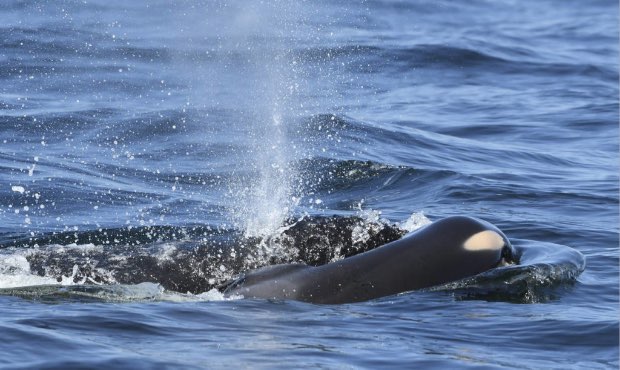forum
library
tutorial
contact

Pinnipeds, Not Commercial Fishing,
Depriving Orca of Salmon
by Nicole Jennings
KIRO Radio, August 3, 2018
|
the film forum library tutorial contact |

|
Pinnipeds, Not Commercial Fishing,
by Nicole Jennings
|
 The plight of the orcas has caught the attention of government leaders after a mother orca was spotted carrying her dead baby for nine days in a row; Tom Nelson of 710 ESPN's "Outdoor Line" podcast has a few ideas for how the state can help save them.
The plight of the orcas has caught the attention of government leaders after a mother orca was spotted carrying her dead baby for nine days in a row; Tom Nelson of 710 ESPN's "Outdoor Line" podcast has a few ideas for how the state can help save them.
"This particular pod of Orcas is struggling now because of prey availability," Nelson said.
There are not enough salmon being produced at hatcheries to feed the Orca in the Puget Sound, Nelson explained, and increasing development has destroyed the salmons' homes.
"That has put a pinch on the diet of these Southern Resident Killer Whale Orcas, which are now experiencing pretty low numbers here in the Puget Sound region," he said.
The biggest problem, Nelson said, is that the pinnipeds are eating up the salmon populations that the Killer Whale Orcas would consume, leaving the whales to starve.
"The pinnipeds in the Columbia River in particular are close to driving several populations [of salmon] to extinction," Nelson said.
Governor Inslee this spring formed the Southern Resident Killer Whale Task Force. The over-population of pinnipeds is not mentioned in the task force's mission statement, however, according to Nelson -- even though, according to the most recent research, pinnipeds consume twice as much salmon as Killer Whales and seven times more salmon than the combination of commercial, tribal, and recreational fishing in the Salish Sea.
"This major source of predation from this over-population of pinnipeds is not even mentioned in the task force's recently issued mission statement . . . The only thing mentioned is vessel traffic and other nebulous emergency actions," Nelson said.
Going after the "low-hanging fruit" of fishing boats will only serve to take revenue from the Washington Department of Fish and Wildlife, which funds salmon hatcheries.
"[People] are not going to buy [fishing] licenses; revenue for the Washington Department of Fish and Wildlife is going to further collapse," Nelson said.
Ironically, after he tossed a finger-sized piece of salmon to a harbor seal on camera, Nelson himself was fined $500 by the National Oceanic and Atmospheric Association.
Nelson suggests relocating the seals out to the open ocean off of the coast. Realistically, he said, about half of the pinnipeds will have to be removed from Puget Sound, either by relocation or killing.
"We have a tremendous problem . . . If right now the pinnipeds are taking seven times what the combined tribal, commercial, recreational catches are, we have to start looking at a number of half . . . or something close to what historical numbers are," he said. "The pinniped numbers have exploded in Puget Sound."
Killing animals that look like "water puppies" is not easy, Nelson said, but is necessary.
"It's a difficult situation, but government's job is addressing difficult situations," he said.
Nelson hopes to testify before NOAA's West Coast Council to "raise awareness" of the pinniped problem.
"The pinnipeds are eating our Killer Whales out of house and home," he said.
Related Pages:
Buoy 10 Challenge/Chinook Salmon Will Mesh
on Friday in Lower Columbia River by Bill Monroe, The Oregonian, 8/12/17
learn more on topics covered in the film
see the video
read the script
learn the songs
discussion forum
